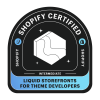
Pros and cons of Shopify: Is it the right platform for you?
Is Shopify really the best choice for your business? In this post, we’ll talk about the pros and cons of Shopify to help you make an informed decision.
Table of Contents
Pros of Shopify – What’s with the popularity
Shopify is incredibly popular among ecommerce businesses, and for good reasons that many can relate to. Imagine you’re setting up your online store for the first time. You want something straightforward that simplifies the complex world of online selling. It provides everything from beautiful, customizable templates to great tools, from marketing to secure payments. This combination of simplicity, great features, and strong security is precisely why so many business owners turn to Shopify when they’re ready to sell online. Let’s see more details about this.
User-friendly interface
Shopify is designed for people who want a clean, straightforward platform. The admin panel is intuitive, meaning you can easily navigate through various functions like adding products, setting up payments, and handling orders.

Themes library
Aesthetic appeal is critical in ecommerce, and this is a spot where Shopify doesn’t disappoint. It offers a wide range of visually appealing, customizable, and responsive themes. This means your online store will look good on both desktop and mobile devices, with a focus on a great shopping experience for your customers. There are free and paid themes, but keep in mind that there are Shopify agencies that might do a fully custom solution.

Built-in tools and features
Shopify comes packed with essential tools made exactly for an online store’s growth. These include SEO features to help your site rank better in search results, marketing tools to run and track campaigns, and analytics to monitor your store’s performance. Additionally, Shopify handles updates and maintenance, letting you focus on selling rather than tech management.
Security features
Online security is non-negotiable, and Shopify excels here. It provides SSL certificates for your site and ensures PCI compliance for handling credit cards—key features that protect both you and your customers from security breaches.
Scalability
As your business grows, so do your needs. Shopify can scale with your business, offering different plans that accommodate increased products, enhanced functionalities, and expanded storage needs. This flexibility means Shopify can support you from startup to large enterprise.
The cons of Shopify – Are these a deciding factor?
While Shopify is packed with features, it’s important to consider its drawbacks, too. In this section, we’ll explore Shopify’s cons and whether they could be deal-breakers for your business. Understanding Shopify’s limitations will help you decide if It’s the right choice for you. Let’s take a closer look.
Transaction fees and pricing
While Shopify offers many built-in features, it isn’t the cheapest option. In addition to monthly plan fees, there are transaction fees if you choose not to use Shopify Payments. Depending on your sales volume, these fees can add up, affecting your bottom line.
Limited customization
Although Shopify’s themes are versatile, you can customize them only so much. These restrictions can be a significant drawback for brands with specific design needs or those who wish to stand out with unique store functionalities. But if you find an agency that will set up your store, this won’t affect your decision.
Reliance on apps
To expand beyond the basics, Shopify often requires additional apps, which can mean extra costs. Moreover, integrating multiple apps can sometimes lead to slower site performance and other technical issues.

Migration challenges
If you decide to switch to or from Shopify, be prepared for potential hurdles. Migrating your existing data can be complex and might require technical assistance. If you find yourself in a position where you should switch ecommerce platforms, feel free to reach out, we’ve done plenty of switches.

Shopify, compared to other platforms
Shopify is popular among businesses of all sizes for its ease of use and strong support system. It’s especially appealing to those who prefer a straightforward platform. Compared to alternatives like WooCommerce, Magento, and BigCommerce, Shopify offers a less complex setup and management process, but this simplicity comes with less flexibility for customization. The good news is that hiring a Shopify development agency can easily repair those two.
For instance, WooCommerce might attract users who require deep customization and are comfortable with technical setups, due to its open-source nature and integration with WordPress. On the other hand, you could probably hear somewhere that Magento might be more suitable for large enterprises with specific needs and the budget for skilled developers, offering powerful customization and scalability. But, Shopify proved these statements wrong with its top tiers – Shopify Advanced and Shopify Plus.
What’s the difference between Shopify Advanced and Shopify Plus?
While Shopify’s user-friendly approach and extensive app marketplace make it an excellent starting point for many businesses, its customization limits and transaction fees could drive businesses toward other platforms. Sticking with Shopify or exploring other options depends on specific business needs and long-term growth strategies.
Make a list of the pros and cons of Shopify for your project
Writing the pros and cons of Shopify list is a good way to check if that platform is good for your business since it really can depend from business to business. One thing is certain: Shopify is a powerful platform that suits many, almost all, ecommerce needs. It’s best for business owners looking for an all-in-one solution that’s easy to manage, secure, and scalable.
You might want to consider the cons, like additional costs and customization limits. Usually, additional costs pay off and customization issues are solved with a Shopify agency.
Weigh these factors against your business priorities, technical skills, and long-term goals. If Shopify aligns with your needs, it could be an excellent choice for setting up and growing your online store.
What about you – are you considering Shopify? We’d love to hear about your project!

